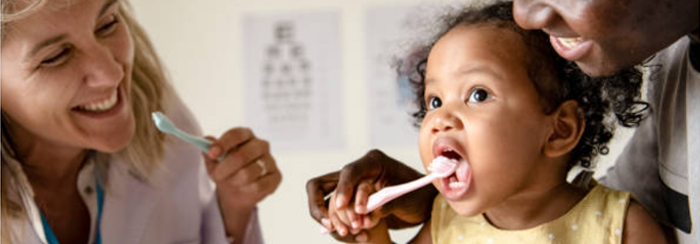How to Properly Care For Infant and Toddler Teeth
Every child deserves a proper start to oral care.

Even if baby teeth don’t technically last forever, how they’re cared for will impact a baby’s oral health in the years to come.
This is because the baby teeth act as a guide for permanent adult teeth to grow into their proper positions, and therefore, it’s important to keep these baby teeth as clean and healthy as possible. In fact, before the baby teeth even begin to come in, a baby’s gums will need to be gently cleaned, too.
Preventing early childhood tooth decay
As soon as a child sprouts their first tooth, they are at risk for the development of tooth decay and cavities. Early childhood tooth decay occurs in children who are from 6 months to 6 years of age.
This decay can cause considerable pain for the baby or child, and the infection can even affect the underlying adult tooth waiting to take the baby tooth’s place. That’s why it’s so important to take the necessary steps to prevent early childhood tooth decay.
Here’s how parents and guardians can ensure their baby’s teeth stay decay-free:
Clean and check your little one’s teeth daily:
Good oral hygiene care involves cleaning your toddler’s gums and teeth daily, in addition to checking around the mouth for any potential issues. Lift your child’s lip for better visualization of the gum line as you clean, and keep an eye out for any white or brown areas which may indicate early tooth decay.
To clean, gently wipe your baby’s gums using a clean wet cloth. When your baby’s teeth begin to appear, use a small, soft-bristled toothbrush along with a rice grain-sized smear of fluoridated toothpaste to clean. Brush your baby’s teeth both in the morning and before bed daily. Once your child turns the age of 3, you can begin using a pea-sized amount of fluoridated toothpaste on the soft-bristled brush.
More on fluoride in children’s oral care:
The Canadian Dental and Medical Associations recommend the use of fluoride for preventing tooth decay in people of all ages - but the use of fluoride from an early age can go a long way in creating a foundation of teeth that are strong and cavity-resistant (although teeth can never be 100% resistant to decay). It’s important however to ensure you’re always using no more than a pea-sized amount after the age of 3, and never let your child brush alone with fluoride toothpaste until they are old enough to know not to swallow.
Limit your baby’s use of their baby bottle or sippy cup:
Try to reduce the amount of exposure your baby gets to the baby bottle or sippy cup when it’s filled with milk or formula, but especially juice. Furthermore, try to avoid supplying your infant with the bottle or cup at bedtime, as the sugars in these liquids will have the opportunity to sit in their mouth, coating their teeth during sleep - where the process of tooth decay formation can rapidly begin.
The same logic can be applied to food in general - as frequent eating or snacking, particularly on sugary or sticky foods, can expose your child’s mouth to more instances of bacteria attacking the teeth.
Limit your baby’s use of their baby bottle or sippy cup:
Try to reduce the amount of exposure your baby gets to the baby bottle or sippy cup when it’s filled with milk or formula, but especially juice. Furthermore, try to avoid supplying your infant with the bottle or cup at bedtime, as the sugars in these liquids will have the opportunity to sit in their mouth, coating their teeth during sleep - where the process of tooth decay formation can rapidly begin.
Supply water for drinking between feedings:
It’s recommended to introduce your toddler to a lidless cup between the ages of 6 and 9 months. After your baby’s first birthday, water is the best choice of beverage between standard feeding times/ for general thirst-quenching.
Avoid cross-contamination:
Toddlers can receive bacteria from parents/guardians or family members through salivary contact, such as by sharing a spoon or eating utensil or sharing a toothbrush. This bacteria, in conjunction with poor oral hygiene and unhealthy eating habits can increase a child’s risk of early childhood tooth decay.
Is it time for your baby to meet the dentist?
The Canadian Dental Association recommends that regular dental visits should begin 6 months after the appearance of a baby’s first tooth, or when they are about 1 year of age.
If it’s time for your little one to have their first visit, you can trust our Teeth First Dental Network of Preferred Provider dentists in Ontario to provide a high standard of children’s oral health care!
Locate an Ontario clinic near you today.